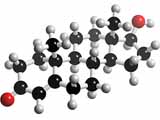|
|
TODAY.AZ / Weird / Interesting
Research: How women change if given the male testosterone hormone?
26 May 2010 [17:49] - TODAY.AZ
Women are more trusting than men because historically they did not have to fight for survival, new research suggests.
 Scientists have discovered that the hormone testosterone, which makes men physically strong and aggressive, seems also to be connected to cynicism and a lack of trust in others. They found that when it was given to women it appeared to "harden them up" and made them less open and more vigilant.
Scientists have discovered that the hormone testosterone, which makes men physically strong and aggressive, seems also to be connected to cynicism and a lack of trust in others. They found that when it was given to women it appeared to "harden them up" and made them less open and more vigilant.Historically for women it was important to be co-operative and sociable in order to survive whereas for men it was more important to be able to fight.
Men therefore evolved with more testosterone than women in order to make them bigger, stronger and more aggressive. It also seems to have made them more wary and to constantly "watch their back" for danger.
For the study, Dr Jack van Honk, a psychologist at Cape Town University, said that testosterone increases social vigilance in order to prepare them for competition and fights for resources. They said: "In the same way that we have evolved capacities to help others, we have also evolved capacities to deceive and cheat.
"Thus, those who are willing to believe what others say, or fail to probe the motivations underlying their actions, may fall prey to considerable economic and social costs.
"Consequently, testosterone increased social vigilance in trusting humans, presumably to better prepare them for the hard-edged competition over status and valued resources."
In order to test the theory researchers gave testosterone pills and dummy pills to 24 women aged about 20 and then asked them to rate the trustworthiness of strangers' faces. The scale went from -100 for very untrustworthy to +100 for very trustworthy.
The half of volunteers who rated faces as most honest after the placebo scored the photographs an average 10 points – or five per cent – lower after ingesting testosterone. The researchers, whose findings are published in Proceedings of the National Academy of Sciences, said the research showed that testosterone "down regulates interpersonal trust".
"Naive, trusting humans run a much greater risk of being misguided and deceived by others," they said.
"The attribution of trust toward unfamiliar others was especially decreased in subjects who run the greatest risk of being misled by others, that is, those who grant trust easily.
"These findings provide insight into the hormonal regulation of human sociality by showing the hormone testosterone down-regulates interpersonal trust in an adaptive manner."
/Telegraph.co.uk/
URL: http://www.today.az/news/interesting/68702.html
 Print version
Print version
Views: 2852
Connect with us. Get latest news and updates.
See Also
- 19 February 2025 [22:20]
Visa and Mastercard can return to Russia, but with restrictions - 05 February 2025 [19:41]
Japan plans to negotiate with Trump to increase LNG imports from United States - 23 January 2025 [23:20]
Dubai once again named cleanest city in the world - 06 December 2024 [22:20]
Are scented candles harmful to health? - 23 November 2024 [14:11]
Magnitude 4.5 earthquake hits Azerbaijan's Lachin - 20 November 2024 [23:30]
Launch vehicle with prototype of Starship made its sixth test flight - 27 October 2024 [09:00]
Fuel prices expected to rise in Sweden - 24 October 2024 [19:14]
Turkiye strikes terror targets in Iraq and Syria - 23 October 2024 [23:46]
Kazakhstan supplied almost entire volume of oil planned for 2024 to Germany in 9 months - 23 October 2024 [22:17]
Taiwan reported passage of Chinese Navy aircraft carrier near island
Most Popular
 Kazakhstan is betting on Baku-Tbilisi-Ceyhan
Kazakhstan is betting on Baku-Tbilisi-Ceyhan
 New details surface about Washington meeting between Baku and Yerevan
New details surface about Washington meeting between Baku and Yerevan
 Ukraine prepares for Erdogan’s visit amid push to ratify free trade agreement
Ukraine prepares for Erdogan’s visit amid push to ratify free trade agreement
 Baku, Yerevan set for Washington talks amid hopes for imminent peace deal
Baku, Yerevan set for Washington talks amid hopes for imminent peace deal
 Turkish business delegation explores investment potential in Alat Free Economic Zone
Turkish business delegation explores investment potential in Alat Free Economic Zone
 Turkish, Azerbaijani FMs discuss bilateral ties and regional cooperation
Turkish, Azerbaijani FMs discuss bilateral ties and regional cooperation
 Victims of Armenian missile attacks recount suffering during Patriotic War
Victims of Armenian missile attacks recount suffering during Patriotic War
